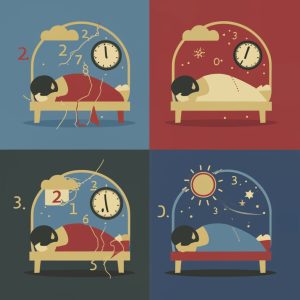Table of Contents
ToggleIntroduction
Nighttime Asthma, a chronic respiratory condition characterized by inflammation and narrowing of the airways, affects millions of people worldwide.
Regrettably, children are not spared from this debilitating ailment.
At night, children’s respiratory systems can react differently due to a range of factors, from allergens in their sleeping environment to underlying health conditions like asthma or colds.
Childhood asthma is a prevalent health issue, with estimates suggesting that approximately 10% of children worldwide are affected by this condition.
As parents and caregivers, it is crucial to grasp the multifaceted nature of asthma and its specific challenges when experienced during nighttime.
The concept of nighttime asthma troubles refers to a distinct set of symptoms that emerge or worsen specifically during sleep.
While asthma symptoms can occur at any time, it has been observed that many individuals, especially children, tend to experience aggravated breathing difficulties during the nocturnal hours.
Understanding why your child’s breathing worsens at night requires delving into the intricate interplay between asthma pathophysiology and various factors closely linked to sleep patterns.

Prevalence of Childhood Asthma
According to extensive research conducted across several countries and cultures, it is evident that childhood asthma poses a significant global health burden.
This respiratory disorder affects countless young lives and necessitates increased awareness for effective management.
Statistics reveal that in developed countries such as the United States and the United Kingdom, approximately 8-10% of children are diagnosed with asthma.
Furthermore, studies indicate an alarming rise in childhood asthma rates over recent decades across both developed and developing nations alike.
This escalating trend brings forth an urgent need for comprehensive understanding and proactive measures to combat this distressing condition.
Unveiling Nighttime Asthma Troubles
Nighttime asthma troubles often remain enigmatic to many parents, as they witness their child’s breathing difficulties intensifying when the sun sets.
Nighttime asthma can manifest in various ways, including coughing fits that disrupt sleep, wheezing that becomes more pronounced during the night hours, or sudden awakening due to difficulty breathing.
These symptoms not only disturb the child’s sleep but can also cause heightened anxiety for parents and caregivers.
The intricate relationship between sleep patterns and asthma exacerbations adds another layer of complexity to managing this condition effectively.

Understanding Asthma
Definition and Causes of Asthma
Asthma is a chronic respiratory condition characterized by inflammation and narrowing of the airways, leading to recurrent episodes of wheezing, coughing, chest tightness, and shortness of breath.
It affects people of all ages but is particularly prevalent among children. The exact cause of asthma remains elusive, but it is believed to result from a combination of genetic predisposition and environmental factors.
Research suggests that individuals with a family history of asthma have an increased likelihood of developing the condition.
Also, exposure to certain allergens and irritants can trigger or exacerbate asthma symptoms.

Common Triggers for Nighttime Asthma Symptoms
Allergens play a significant role in triggering asthma symptoms for many people.
Dust mites, microscopic creatures commonly found in bedding, mattresses, and upholstered furniture, are known to evoke allergic reactions that can worsen asthma.
Pet dander, consisting of tiny flakes of skin shed by animals like cats and dogs, also frequently triggers allergic responses in asthmatics.
Smoke from tobacco products or wood-burning stoves can be highly irritating to the airways and cause inflammation.
Strong odors from perfumes or cleaning agents may also act as irritants for susceptible individuals with asthma.
Also, air pollution arising from vehicle emissions or industrial activities has been linked to an increased risk of developing or worsening existing respiratory conditions like asthma.
Respiratory infections represent another significant trigger for asthma symptoms—particularly viral infections such as colds and influenza viruses.
The combination of inflamed airways and the infection’s effects on respiratory function can result in more frequent coughing, wheezing, and breathing difficulties, making asthma management more challenging during these times.
The Role of Circadian Rhythm in Nighttime Asthma Symptoms
Circadian rhythm refers to the natural internal clock that regulates various physiological processes in our bodies, including sleep-wake cycles, hormone release, and body temperature.
It operates on a roughly 24-hour cycle and is influenced by external cues, primarily light and darkness.
The impact of circadian rhythm extends beyond sleep patterns; it also affects numerous other bodily functions.
Cortisol levels are typically highest in the morning, helping us wake up and stay alert throughout the day.
Melatonin production, responsible for promoting sleepiness, increases during the evening hours to facilitate falling asleep at night.
Disturbances in these hormonal rhythms can disrupt our daily routines and have significant implications for individuals with asthma.

How Circadian Rhythm Affects Lung Function
Research has shown that lung function exhibits distinct variations throughout the day due to its interaction with circadian rhythms.
During normal circumstances, lung function demonstrates a peak during late afternoon or early evening hours.
Unfortunately for those struggling with asthma, their lung function follows a different pattern.
Studies have found that individuals with asthma experience increased airway inflammation during the night compared to daytime hours.
This heightened inflammation leads to the narrowing of the airways (bronchoconstriction), making it more challenging for them to breathe comfortably during sleep.
Additionally, variations in hormone levels regulated by circadian rhythms also impact bronchial smooth muscle tone—which refers to the degree of constriction or relaxation of the muscles lining the airways.
Hormones such as cortisol exhibit minimum levels during the night, potentially contributing to increased bronchial hyperresponsiveness and subsequent asthma symptoms.
This interaction between circadian rhythm, hormone fluctuations, and lung function helps us understand why individuals with asthma often experience nighttime breathing difficulties.

Triggers Specific to Nighttime Asthma Troubles
Among the most common nocturnal allergens are dust mites, microscopic creatures that thrive in our bedding and pillows.
These minuscule arachnids feed on dead skin flakes and reproduce rapidly in warm, humid environments.
Unfortunately, their fecal matter contains proteins that can induce allergic reactions in sensitive individuals, leading to flare-ups in asthma symptoms during sleep.
Another sneaky culprit seeking refuge within the sanctuary of our bedrooms is mold.
With increased humidity levels during sleep, mold spores find fertile ground to flourish and multiply.
For those with asthma, these spores can trigger an immune response, causing inflammation of the airways and contributing to nighttime breathing difficulties.
Physiological Changes During Sleep
During slumber’s embrace, our body undergoes intricate changes as it slips into a state of restorative rest.
However, for children with asthma, some of these physiological shifts can worsen their breathing woes at night.
The supine position—lying on one’s back—in particular poses challenges for those prone to nighttime asthma troubles.
As gravity pulls down on the chest while lying flat on one’s back, increased pressure is exerted upon delicate airways already constricted by inflammation or bronchospasm characteristic of asthma.
This mechanical effect further obstructs airflow and can intensify respiratory distress during sleep.
Moreover, while deep in dreamland’s grip, our body’s reflexes can be momentarily subdued.
For individuals with asthma, this means a diminished cough reflex during sleep.
Impact of Sleep Quality on Nighttime Asthma Symptoms
It is important to note that there exists a bidirectional relationship between poor sleep quality and worsening asthma symptoms.
When asthma symptoms worsen during the night, they can disrupt sleep patterns, leading to further exacerbation of the condition.
Poorly controlled asthma can cause frequent awakenings due to coughing, wheezing, or shortness of breath.
These nighttime disturbances not only compromise the duration but also the quality of sleep, resulting in fragmented and restless nights.
Disrupted sleep can lead to daytime fatigue and decreased cognitive function, affecting daily activities like school performance or work productivity.
Also, research has shown that poor sleep may have an adverse effect on immune function and airway inflammation regulation in individuals with asthma.
Sleep deprivation has been linked to increased production of pro-inflammatory cytokines and a reduction in anti-inflammatory mediators within the respiratory system.
Disrupted Sleep Due to Coughing and Wheezing
Nighttime asthma troubles often manifest as coughing fits, wheezing episodes, or feelings of breathlessness that disrupt normal sleep patterns.
These symptoms arise due to various factors such as increased airway inflammation during the night or physiological changes associated with sleeping positions.
Coughing is a common symptom experienced by asthmatics during the night due to increased bronchial hyperresponsiveness triggered by exposure to allergens or irritants present in bedrooms.
The persistent irritation caused by these triggers leads to recurrent coughs that disturb both the individual’s own sleep as well as those around them.
Wheezing, a characteristic high-pitched whistling sound produced during exhalation, often intensifies at night.
This nocturnal symptom can be attributed to the increased concentration of inflammatory mediators and the greater vulnerability of airways during sleep due to reduced bronchial muscle tone.
This sensation creates anxiety and further disrupts sleep, contributing to a vicious cycle of worsening symptoms.

Managing Nighttime Asthma Troubles
Creating an Asthma-Friendly Bedroom Environment
Designing a bedroom environment that minimizes asthma triggers can significantly alleviate nighttime asthma troubles.
Begin by encasing mattresses, pillows, and duvets in allergen-proof covers to prevent dust mites from infesting bedding.
Regularly washing bedding in hot water further eliminates these microscopic creatures.
Opt for hardwood or laminate flooring instead of carpets, which tend to harbor dust and allergens.
Keeping the bedroom clean and free of clutter is crucial as well; dusty surfaces attract irritants and particles that can trigger asthma symptoms.
Investing in an air purifier with a HEPA filter will help remove potential allergens from the air, ensuring a cleaner breathing environment during sleep.
Medications and Asthma Action Plans
Effective management of nighttime asthma troubles often involves medication strategies and personalized action plans formulated by healthcare professionals.
Quick-relief medications, such as bronchodilators (short-acting beta agonists), provide immediate relief by opening narrowed airways during sudden asthma attacks.
Incorporating these medications into an individualized asthma action plan ensures their timely administration when symptoms arise during the night.
However, it is important to remember that preventive maintenance medications play a crucial role in managing nighttime asthma as well.
Inhaled corticosteroids are commonly prescribed for their anti-inflammatory properties, reducing airway inflammation even during sleep hours.
Long-acting bronchodilators may also be prescribed to control nocturnal symptoms more effectively.
A Word from HealthyVibe
Nighttime asthma troubles can be distressing for both children and parents alike, but understanding the underlying causes and implementing effective management strategies can greatly improve quality of life.
By creating an asthma-friendly bedroom environment through simple modifications like encasing bedding in allergen-proof covers, using air purifiers with HEPA filters, and maintaining cleanliness, triggers can be minimized.
Collaborating with healthcare professionals to develop personalized asthma action plans that include both quick-relief and preventive medications ensures timely intervention during nighttime exacerbations.
With proper management techniques, children with nighttime asthma troubles can experience better sleep, reduced symptoms, and improved overall well-being.
Remember, although asthma can present challenges, it is a condition that can be effectively managed, empowering children to lead active and fulfilling lives.
FAQ
1. What are the common symptoms of nighttime asthma in children?
Common symptoms include coughing, wheezing, and breathlessness that worsen during sleep.
2. How does circadian rhythm affect nighttime asthma symptoms during sleep?
Circadian rhythm influences nighttime asthma by causing increased airway inflammation and bronchial constriction during the night.
3. What can parents do to create an asthma-friendly bedroom environment?
Parents can encase bedding in allergen-proof covers, maintain cleanliness, and use air purifiers with HEPA filters to minimize triggers.
4. Are there specific medications for managing nighttime asthma troubles?
Yes, medications such as bronchodilators and inhaled corticosteroids can be part of an asthma action plan for nighttime symptom management.
5. How does disrupted sleep impact a child’s overall asthma management?
Disrupted sleep due to asthma symptoms can lead to daytime fatigue, and decreased cognitive function, and may worsen the overall asthma condition.











